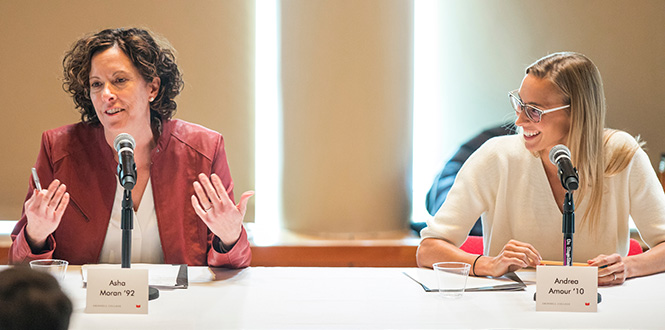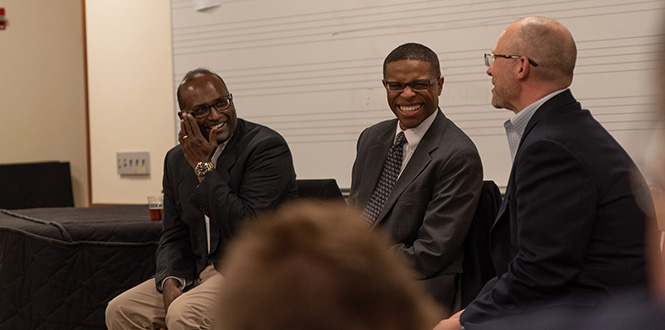How to succeed in business without really majoring it
Feb. 22, 2019 — When Mark Peltz, Daniel ’77 and Patricia Jipp ’80 Finkelman Dean of Careers, Life, and Service, first arrived at Grinnell College in 2011 he noticed that students didn’t outwardly say they wanted to go into business and finance careers.
“But over the last few years it’s become more permissible to say it, and I’m grateful for that,” Peltz says. “We need Grinnellians in business, the military, the State Department and other roles.”
That’s one reason why the Center for Careers, Life, and Service (CLS) and the Office of Development and Alumni Relations invited back alumni and friends of the College to interact with students during the Business and Finance Symposium Tuesday and Wednesday. The event’s theme was From Plato to the Boardroom: Turning a Liberal Arts Degree into a Successful Business Career.
 Asha Moran ’92, left, and Andrea Leiser ’10 talk about entrepreneurship and the liberal arts Tuesday during the Business and Finance Symposium.
Asha Moran ’92, left, and Andrea Leiser ’10 talk about entrepreneurship and the liberal arts Tuesday during the Business and Finance Symposium.
The symposium began with a session on entrepreneurship and the liberal arts featuring Grinnell graduates who run successful startup companies. Asha Moran ’92, principal at Clear Path Consulting in Ashville, North Carolina, and Andrea Leiser ’10, founder and CEO of UpDate Coaching, were the panelists. Students also attended a workshop led by Leiser regarding how to be an entrepreneur. She shared how she created a company to solve a problem she saw and in the process launched a career inspiring people to create deeply fulfilling and lasting relationships.
The events continued Wednesday with a panel discussion on creating a successful business career with a liberal arts degree, featuring panelists Sherman Willis ’01, a State Farm agent in Omaha, and Ravi Rajagopal, head of operational audit for Motiva Energy in Houston.
“When I graduated from Grinnell, I was ready to argue with anyone,” Willis said regarding how a liberal arts education benefited him. “This school refined my critical thinking skills, and I could state my case. Those are things that that come in handy no matter what job you do. Law school was easier for me because I got a foundation here at Grinnell. And that foundation can never be taken away.”
Willis studied political science at Grinnell, participated in student government, and met his future wife in the Writing Lab. He went on to Iowa Law School, and then worked for Judge Henry Wingate ‘69, a former Grinnell Trustee. Later came a position as in-house counsel with Liberty Mutual followed by being a business owner with State Farm.
“I was blessed to have a good Grinnell experience, and I encourage you to maximum your experience here,” Willis told the students in attendance. “Joining organizations, and studying abroad in London improved my world view. And it prepared me to own my own business.”
 Ravi Rajagopal, left, and Sherman Willis ’01 share a laugh with Mark Peltz, dean of Careers, Life, and Service; during a panel discussion about creating a successful business career with a liberal arts degree.
Ravi Rajagopal, left, and Sherman Willis ’01 share a laugh with Mark Peltz, dean of Careers, Life, and Service; during a panel discussion about creating a successful business career with a liberal arts degree.
Rajagopal is a 1988 graduate of Alma College, a liberal arts school in Michigan. He worked as a tax counselor for BP, and was head of audits at Centrica, a British multinational energy company, before his current position at Motiva.
“If you told me in 1988, I word be an accountant, lawyer, and work in oil and gas, I wouldn’t have believed any of those things,” Rajagopal said. “But education forges a path. What I didn’t realize at the time was taking liberal arts classes, such as world history, forced me to analyze things and try to solve problems. And that’s what I look for today when hiring employees. Everyone in the job pool has the same degree. I want someone who can perform analysis and make decisions.”
Both panelists offered plenty of advice for the path students can take to get into business and finance careers, and how to land that first job. For students considering graduate school, Rajagopal advised to get a few years of work experience first. That experience will help a student get into a better business school, which it turn could help open more doors in the job hunt.
Willis, who served on the Alumni Council for six years, recommends students tap into Grinnell alumni to build a professional network. He noted that Grinnell Connect is a wonderful resource to find alums in certain fields or certain parts of the country.
“We have a wonderful database of alumni,” he says. “Reach out to an alum. You will find that we are here to help.”
The symposium was organized by the College’s Business and Finance Career Community. The community was set up in 2017 to prepare students for careers in the diverse and fast-changing business and finance sector.
Through the Center for Careers, Life, and Service’s seven career communities, students have access to specialized advising, tailored programming, and experiential learning opportunities. Interactions with peers, alumni, and recruiters are designed to help students further explore, clarify, and pursue meaningful post-graduate pathways.
—by Jeremy Shapiro